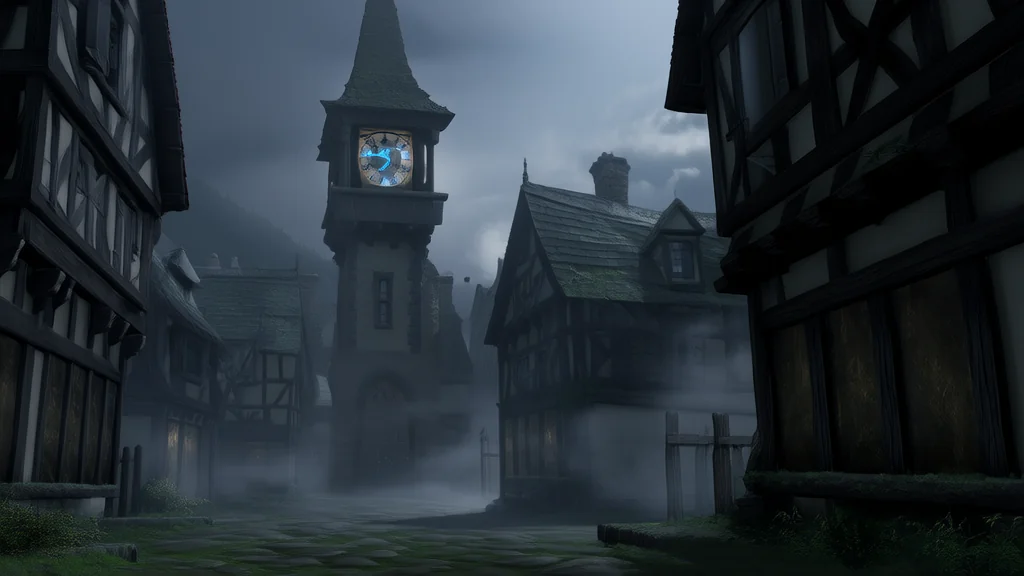🔮 Weird Tales & Urban Legends
The Clock That Never Told the Truth: A Village Secret Hidden in Time

The old clock tower in the heart of the village had always been a place of quiet fascination. Its hands moved with an eerie precision, ticking like a heartbeat that never faltered. But no one could explain why the clock never seemed to show the correct time. It was always either five minutes fast or ten minutes slow, depending on who asked. The villagers whispered about it, but no one ever dared to fix it. They said it was cursed.
Elias had always been curious. He was a young man with a mind full of questions and a heart that beat too fast for his own good. When he first arrived in the village, he noticed the clock immediately. It stood alone at the edge of the square, surrounded by ivy that clung to its stone walls like fingers. The bell had long stopped ringing, but sometimes, when the wind blew just right, Elias swore he heard it echo from somewhere deep inside the tower.
One evening, as the sun dipped below the horizon and painted the sky in shades of violet and gold, Elias decided to investigate. He climbed the creaking iron stairs, each step groaning under his weight. The air grew colder as he ascended, and the deeper he went, the more the world outside seemed to fade. At the top, he found a small room filled with dusty gears and broken mechanisms. A single window overlooked the village, but through it, he saw something strange.
The village looked exactly the same as it had before, yet the people moved as if they were caught in a dream. Some walked backward, others paused mid-step, their eyes blank and unseeing. Elias turned around, expecting to see the clock's face, but instead, he saw a mirror. His reflection stared back at him—but it wasn't him. The figure in the mirror smiled, then turned slowly to face the clock.
When Elias looked again, the clock showed 3:17. He had no idea what time it was in the real world, but he knew it wasn’t three seventeen. He reached out to touch the glass, and the moment his hand made contact, the room plunged into darkness.
He awoke on the floor, disoriented and trembling. The clock now read 4:22. He ran down the stairs, breath ragged, and stumbled into the square. The villagers were moving normally again, as if nothing had happened. No one noticed the change in the clock, nor did they seem to care. Elias tried to speak, but his words felt foreign on his tongue.
That night, he began to notice other things. The moon sometimes appeared twice in the sky, once in the east and once in the west. Birds flew in circles, as if chasing their own shadows. And every time he looked at the clock tower, it was always different—sometimes it was taller, sometimes shorter, and once, it looked like it had no roof at all.
He started keeping a journal, writing down every anomaly he encountered. He wrote about the way time seemed to stretch and contract, how some days passed in minutes while others dragged on for hours. He wrote about the whispers that came from the tower, faint and unintelligible, but always there. He wrote about the feeling that someone—or something—was watching him.
One morning, Elias found a new entry in his journal. The words were not his own. They read: "You are not the first. You will not be the last."
He searched the tower again, this time with a flashlight. Inside, he discovered a hidden door behind the gears. It led to a narrow staircase spiraling downward into the earth. The air was damp and cold, and the walls were lined with symbols that pulsed faintly in the dark. At the bottom, he found a chamber with a large circular table in the center. Around it, there were six empty chairs.
As he stepped closer, the floor beneath him shifted. The ground rippled like water, and the walls began to blur. He felt himself being pulled forward, not physically, but mentally. Images flooded his mind—people standing in the same spot, repeating the same actions over and over. He saw a woman in a red dress, her face blurred, sitting in one of the chairs. She looked up, met his eyes, and smiled. Then she was gone.
Elias ran back up the stairs, his heart pounding. He didn’t know what he had seen, but he knew it wasn’t meant for him. That night, he left the village without saying goodbye.
But the clock tower remained. And every so often, when the wind blew just right, the villagers would hear the distant sound of a bell, echoing from somewhere deep within the tower. They never questioned it. They only listened, and then they moved on, as if time itself had already forgotten them.
发布于 en
🔗
相关站点
- AI Blog — AI 趋势与技术新闻